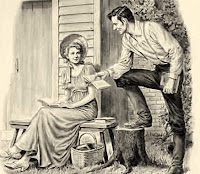"Literature adds to reality, it does not simply describe it. It enriches the necessary competencies that daily life requires and provides; and in this respect, it irrigates the deserts that our lives have already become." (C.S. Lewis)
So this semester, I am taking Intro to Literature up at JCCC and LOVING it. So far it has been simply fantastic and I have had so much fun. Of course, my literature book and I have sort of a love hate relationship going on...it just so happens that all 2500 some-odd pages of this specimen of literature add about 5 pounds to my already murderous backpack...but then, I really simply adore its contents, so whats a girl to do? Continue going to Literature class and luxuriate in loosing myself in its pages? Yes. Set up an appointment with a chiropractor after carrying around 30 pounds on my back for a whole semester? Yes, too.
Annnyyway I am good at free-association :D Haha. The point of this post was ACTUALLY to share with you a pair of interesting poems we read in class today. The two were written by William Blake in the 1800s as companions for eachother, if you will, and are much more enjoyable if read together and then compared. So with out further ado, I present to you The Tyger and The Lamb:
The Lamb
Little Lamb, who made thee?
Dost thou know who made thee?
Gave thee life, and bid thee feed,
By the stream and o'er the mead;
Gave thee clothing of delight,
Softest clothing, woolly, bright;
Gave thee such a tender voice,
Making all the vales rejoice?
Little Lamb, who made thee?
Dost thou know who made thee?
Little Lamb, I'll tell thee,
He is called by thy name,
For He calls Himself a Lamb.
He is meek, and He is mild;
He became a little child.
I a child, and thou a lamb,
We are called by His name.
Little Lamb, God bless thee!
Little Lamb, God bless thee!
The Tyger
Tyger! Tyger! burning bright
In the forests of the night
What immortal hand or eye
Could frame thy fearful symmetry?
In what distant deeps or skies
Burnt the fire of thine eyes?
On what wings dare he aspire?
What the hand dare seize the fire?
And What shoulder, and what art,
Could twist the sinews of thy heart?
And when thy heart began to beat,
What dread hand? and what dread feet?
What the hammer? what the chain?
In what furnace was thy brain?
What the anvil? what dread grasp
Dare its deadly terrors clasp?
When the stars threw down their spears,
And watered heaven with their tears,
Did he smile his work to see?
Did he who made the lamb make thee?
Tyger! Tyger! burning bright
In the forests of the night,
What immortal hand or eye
Dare frame thy fearful symmetry?
Is the author comparing good and evil? Heaven and hell? Human nature before the fall vs. after the fall of man? Phrases in these poems point to all of these. And now, the fun part, is to explore for yourself and deide:)









.jpg)







